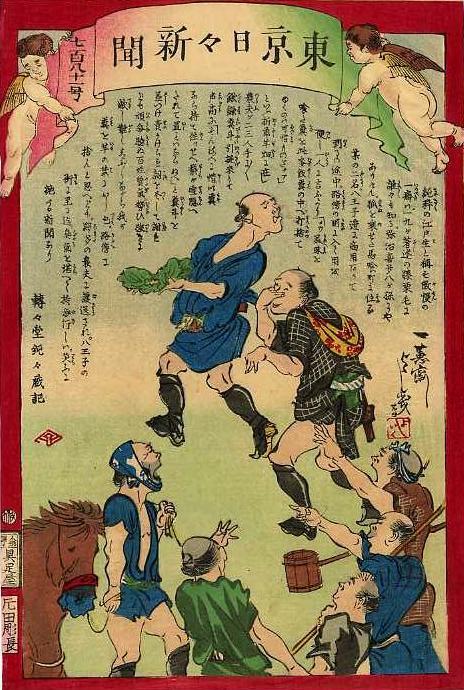Commentary
The language is very colorful and suggests how people actually talked. Most worthy of attention are variations in the names for the places of elimination, and words about the business of elimination and the uses of human manure.
Tentenō, the gesaku (戯作) writer Takabatake Ransen, adds 戯記 (geki) or "frivolous writing" rather than the usual 記 (ki) or 誌 (shi) after his name. He also signs TNS-913b, TNS-1036b, and TNS-1046 this way -- reminiscent of 戯筆 (girefude) or "frivolous brushing" in Yoshiiku's signature on the frontispiece of Kanagaki Robun's Aguranabe.
commercial business 商用 (shiyauyou, shōyō). By itself "yo" (用) means some of kind of business, matter, purpose, or use, and is commonly used as suffix to express this range of meanings.
doing business refects 用を便し (you wo ben shi, yō o ben shi). The expression usually alludes to the business of eliminating urine and feces. The "ben" appears in many related terms, such as benjo (便所), shōben (小便), and daiben (大便), meaning "place for doing [business]" (toilet), "little doing" (urine, urination), and "big doing" (feces, defecation).
outhouse 厠 (kawaya). Originally a hut built by a house, beside or over a river, used as a toilet. It was once the most common word for what is now generally called o-tearai (お手洗い) or "handwashing [place]" if not toiretto (トイレット).
crap 糞 (kuso). The semantic range of this very common includes "shit" but also "wax" as in earwax, and appears in a number of expressions that express negative feelings about something or someone. Cuter words, with greater social currency, include "unko" and "unchi". Medical terms related to human feces and defication generally use "ben" (便). Dung and droppings of other members of the animal kingdom is usually called "fun" (糞), which shares the character used to write "kuso" in this story.
manure laddle 糞斗 (kohibishiyaku, koibishaku). Used to distribute manure, typically human excrement or nightsoil, in a field.
lavatory 雪隠 (setchin). This word, used to refer to the toilet in a garden with a tea room, figures in many Japanese expressions. On the surface it means "[place] concealed by snow" and appears to be a Japanese derivation from Chinese. Kojien (5th edition) attributes it to a story about monks who cleaned toilets at Línyìn temple (霊隠寺) at Mt. Xuĕdòu (雪竇山) in what is now Zhèjiāng province. I could also be a Japanese morphing of 西浄, a chán (禅 J. zen) term for a toilet located to the west of a temple.
news reflects 新聞 (shinbun), which at the time was a fairly new word.
